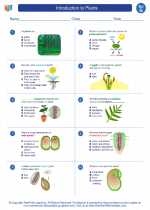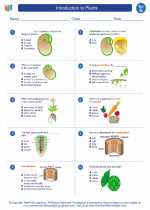Introduction to Plants -> cell wall
Cell Wall
The cell wall is a rigid, structural layer that surrounds the cell membrane in plant cells, fungi, algae, and some bacteria. It provides support and protection for the cell, helping it maintain its shape and preventing it from bursting or collapsing.
Composition
Cell walls are primarily composed of cellulose, a complex carbohydrate that forms long, fibrous chains. In addition to cellulose, cell walls also contain other polysaccharides, proteins, and sometimes lignin, a complex polymer that adds strength and rigidity to the wall.
Functions
1. Structural Support: The cell wall provides structural support to plant cells, allowing them to maintain their shape and withstand the pressure of turgor, the internal pressure caused by the influx of water into the cell.
2. Protection: Cell walls protect the cell from physical damage and pathogens, acting as a barrier that prevents the entry of harmful substances.
3. Regulation of Water Uptake: Cell walls help regulate the uptake of water and nutrients into the cell, contributing to the overall osmotic balance.
Study Guide
Here are some key points to remember about cell walls:
- The main component of cell walls in plants is cellulose, a complex carbohydrate.
- Cell walls provide structural support and protection for the cell.
- In addition to cellulose, cell walls may also contain other polysaccharides, proteins, and lignin.
- Cell walls help regulate water uptake and maintain the osmotic balance within the cell.
- Cell walls are found in plant cells, fungi, algae, and some bacteria.
Remember to review the functions and composition of cell walls to gain a thorough understanding of this important cellular structure.
[Cell Wall] Related Worksheets and Study Guides:
.◂Science Worksheets and Study Guides Seventh Grade. Introduction to Plants

 Worksheet/Answer key
Worksheet/Answer key
 Worksheet/Answer key
Worksheet/Answer key
 Worksheet/Answer key
Worksheet/Answer key
 Worksheet/Answer key
Worksheet/Answer key
 Vocabulary/Answer key
Vocabulary/Answer key
 Vocabulary/Answer key
Vocabulary/Answer key
 Vocabulary/Answer key
Vocabulary/Answer key
 Vocabulary/Answer key
Vocabulary/Answer key
 Vocabulary/Answer key
Vocabulary/Answer key
